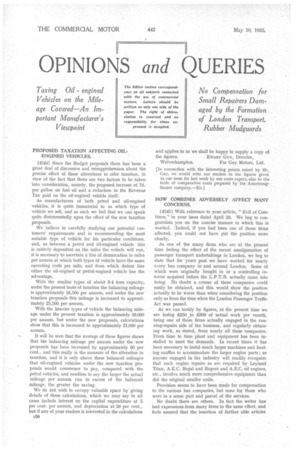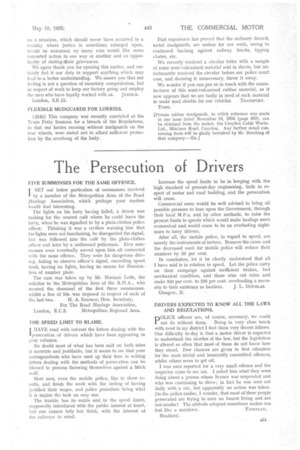OPINIONS and QUERIES
Page 108

Page 109

If you've noticed an error in this article please click here to report it so we can fix it.
Taxing Oil engined Vehicles on the Mileage Covered—An Important Manufacturer's Viewpoint
PROPOSED TAXATION AFFECTING OILENGINED VEHICLES.
[45441 Since the Budget proposals there has been a great deal of discussion and misapprehension about the precise effect of these alterations in oiler taxation, in view of the fact that there are two factors to be taken • into consideration, namely, the proposed increase of 7d. per gallon on fuel oil and a reduction in the Revenue Tax paid on the oil-engined vehicle itself.
• As manufacturers of both petrol and oil-engined vehicles, it is quite immaterial to us which type of vehicle we sell, and as such we feel that we can speak quite disinterestedly upon the effect of the new taxation proposals.
We believe in carefully studying our potential customers' requirements and in recommending the most suitable type of vehicle for his particular conditions, and, as between a petrol and oil-engined vehicle this is entirely dependent on the miles the vehicle will run, it is necessary to ascertain a line of demarcation in miles per annum at which both types of vehicle have the same operating costs per mile, and from which datum line either the oil-engined or petrol-engined vehicle has the advantage.
With the smaller types of about 3-4 tons capacity, under the present basis of taxation the balancing mileage is approximately 16,500 per annum, and under the new taxation proposals this mileage is increased to approximately 25,500 per annum.
With the heavier types of vehicle the balancing mileage under, the present taxation is approximately 19,000 per annum, but under the new proposals, calculations show that this is increased to approximately 31,000 per annum.
It will be seen that the average of these figures shows that the balancing mileage per annum under the new proposals has been increased by approximately 60 per cent., and this really is the measure of the alteration in • taxation, and it is only above these balanced mileages that oil-engined vehicles under the new taxation proposals would commence to pay, compared with the petrol vehicles, and needless to say the larger the actual mileage per annum run in excess of the balanced mileage, the greater the saving.
We do not wish to occupy valuable space by giving details of these calculations, which we may say in all cases include interest on the capital expenditure at 5 per cent, per annum, and depreciation at 20 per cent., but if any of your readers is interested in the calculations c50 and applies to us we shall be happy to supply a copy of the figures. EWART Guy, Director, Wolverhampton. For Guy Motors, Ltd.
[In connection with the interesting points raised by Mr. Guy, we would refer our readers to the figures given in our issue for last week by our costs expert, also to the table of comparative costs prepared by the ArmstrongSaurer company.—En.]
HOW COMBINES ADVERSELY AFFECT MANY CONCERNS.
[45451 With reference to your article, "Evil of Combines," in your issue dated April 26. We beg to congratulate you on the concise manner in which this is • worded. 'Indeed, if you had been one of those firms affected, you could not have put the position more clearly.
As one of the many firms who are at the present time feeling the effect of the recent amalgamation of passenger transport undertakings in London, we beg to state that for years past we have worked for nearly every bus company in and around London. Some of which were originally bought in 'or a controlling in terest acquired before the L.P.T.B. actually came into being. No doubt a census of these companies could easily be obtained, and this would show the position actually to be worse than when considering the position only as from the time when the London Passenger Traffic Act was passed.
As we can testify by figures, at the present time we are losing £250,to 2300 of actual work per month, being one of those firms actually engaged in the run ning-repairs side of the business, and regularly obtaining work, as stated, from nearly all these companies. From time to time plant and equipment has been in stalled to meet the demands. In recent times it has been necessary to instal much larger machines and heating muffles to accommodate the larger engine parts ; as anyone engaged in the industry will readily recognize that such engine repairs as are required by Leyland Titan, A.E.C. Regal and Regent and A.E.C. oil engines, etc., involve much more comprehensive equipment than did the original smaller units.
Provision seems to have been made for compensation to the various bus companies, but none for those who were in a sense part and parcel of the services.
No doubt there are others. In fact the writer has had expressions from many firms to the same effect, and feels assured that the insertion of further able articles on a situation, which should never have occurred in a country where justice is sometimes enlarged upon, would be welcomed by many who Would like some concerted action in one way or another and an opportunity of stating 4heir grievances.
We again thank you for opening this matter, and certainly feel it our duty to support anything which may lead to a better understanding. We.assure you that our feeling is not a question of monetary compensation, but in respect of work to keep our factory going and employ the men who have loyally worked with us. JUSTICE.
London, S.E.15.
FLEXIBLE MUDGUARDS FOR LORRIES.
14546] This company was recently convicted at the Truro Petty Sessions for a breach of the Regulations, in that our lorries running without mudguards on the rear wheels, were stated not to afford sufficient protection by the overhang of the body. Past experience has proved that the ordinary domed, metal mudguards, are useless for our work, owing to continued backing against railway trucks, tipping chutes, etc.
We recently received a circular letter with a sample of some semi-vulcanized material sold in sheets, but unfortunately received the circular before our police court case, and deeming it unnecessary, threw it away.
We wonder if you can put us in touch with the manufacturer of this semi-vulcanized rubber material, as it now appears that we are badly in need of such material to make mud shields for our vehicles. TRANSPORT. Truro. '
[Pemax rubber mudguards, to which reference was made in our issue dated November 16, 1934 (page 453), can be obtained from the maker, the Croydon Cable Works, Ltd., Mitcham Road, Croydon. Any further detail concerning them will be gladly furnished by Mr. Brooking of that company.—En.]




































































































































































